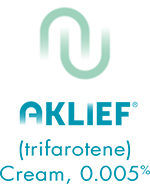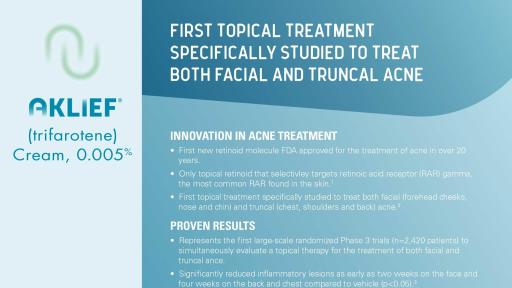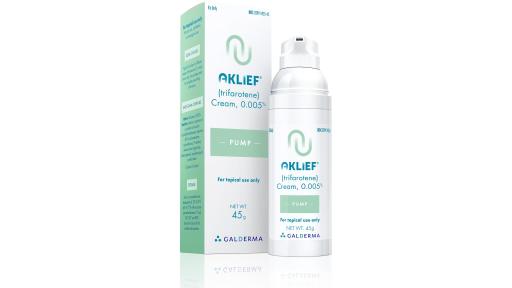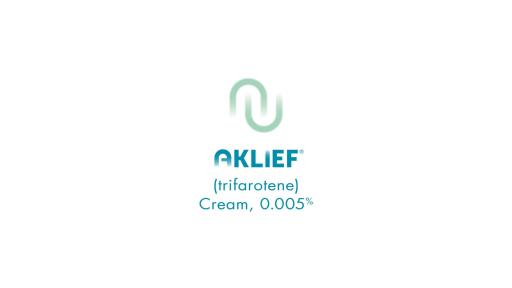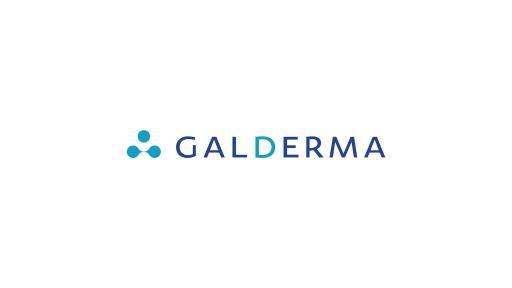Galderma Receives FDA Approval for AKLIEF® (trifarotene) Cream, 0.005%, the First New Retinoid Molecule for the Treatment of Acne in Over 20 Years
Next-Generation Treatment is First Option Studied and Proven Effective in Both Facial and Truncal Acne
FORT WORTH, Texas – (October 4, 2019) – Galderma, a global leader focused on meeting the world’s increasing skin health needs, announced today that the U.S. Food and Drug Administration (FDA) approved AKLIEF® (trifarotene) Cream, 0.005% for the topical treatment of acne. AKLIEF Cream is the only topical retinoid that selectively targets retinoic acid receptor (RAR) gamma, the most common RAR found in the skin.1,2,3 Trifarotene is the first new retinoid molecule to receive U.S. FDA approval for the treatment of acne in more than 20 years.4,5,6 AKLIEF Cream is the first topical treatment specifically studied and proven to treat both facial (forehead, cheeks, nose and chin) and truncal (chest, shoulders and back) acne, offering healthcare professionals and acne patients another treatment option.1
“While retinoids are foundational therapies to treat acne, there has been little innovation in decades.” said Sandra Johnson, M.D., FAAD, an investigator in the clinical trials of AKLIEF Cream and a dermatologist at Johnson Dermatology in Fort Smith, Arkansas. “With the approval of AKLIEF Cream, I am excited to offer my patients a unique, highly targeted retinoid that reduces inflammatory lesions on the face, back, chest and shoulders, that has also been shown to be safe and well-tolerated.”
The FDA approval of AKLIEF Cream is supported by data from the two pivotal Phase 3 clinical trials of once-daily AKLIEF Cream in patients with moderate acne on the face and trunk.1 The two identical 12-week, randomized, multicenter, parallel group, double-blind, vehicle-controlled clinical trials of 2,420 patients showed that AKLIEF Cream significantly reduced inflammatory lesions as early as two weeks on the face and four weeks on the back, shoulders and chest compared to vehicle (p<0.05).1 AKLIEF Cream was well tolerated when used on the face, back, shoulders and chest.1 The most common adverse reactions (incidence>1%) included application site irritation, application site pruritus (itching) and sunburn.1
“The approval of AKLIEF Cream underscores our ability to bring new active molecules to the community, and innovate even in well-established therapeutic classes. It is consistent with our intent to change the paradigm of how even the most common and frustrating skin diseases are treated, including acne,” said Thibaud Portal PhD, Galderma Global Vice President, Prescription. “We are pleased to add this new treatment option, with proven efficacy in facial and truncal acne, to our innovative and differentiated portfolio of acne treatments.”
AKLIEF Cream is expected to be available in the United States in November 2019. It will be provided in a 45 gram pump. Galderma is working closely with payers, providers and pharmacy benefit managers to ensure broad and rapid access to AKLIEF Cream. The company will also offer a patient savings card program, Galderma CareConnect*.
*Galderma CareConnect is only available for commercially insured or uninsured patients. Patients who are enrolled in a government-run or government-sponsored healthcare plan with a pharmacy benefit are not eligible to use the Galderma CareConnect Patient Savings Card.
About Acne
Acne is the most common skin disease in the United States, affecting up to 50 million Americans annually and approximately 85% of young people.7 An inflammatory disease, acne occurs when a combination of sebum (oil) and dead skin cells clog pores, allowing the bacteria associated with acne (p. acnes) to grow.7,8 Acne on the face is the most common and often the most visible presentation of the disease. More than half of people with facial acne (52%) also have truncal acne.9 Adult acne tends to affect women more often than men and adult-onset acne is becoming increasingly common in women in their 20s and beyond.10 Back acne, once thought to be a predominantly male disease, has been shown to be prevalent in females.10 Acne can trigger feelings of depression, poor body image and low self-esteem.11
AKLIEF Cream U.S. Important Safety Information
Indication: AKLIEF® (trifarotene) Cream, 0.005% is a retinoid indicated for the topical treatment of acne vulgaris in patients 9 years of age and older. Adverse Events: The most common adverse reactions (incidence ≥ 1%) in patients treated with AKLIEF Cream were application site irritation, application site pruritus (itching), and sunburn. Warnings/Precautions: Patients using AKLIEF Cream may experience erythema, scaling, dryness, and stinging/burning. Use a moisturizer from the initiation of treatment, and, if appropriate, depending upon the severity of these adverse reactions, reduce the frequency of application of AKLIEF Cream, suspend or discontinue use. Avoid application of AKLIEF Cream to cuts, abrasions or eczematous or sunburned skin. Use of “waxing” as a depilatory method should be avoided on skin treated with AKLIEF Cream. Minimize exposure to sunlight and sunlamps. Use sunscreen and protective clothing over treated areas when exposure cannot be avoided.
You are encouraged to report negative side effects of prescription drugs to the FDA. Visit www.fda.gov/medwatch or call 1-800-FDA-1088.
About Galderma
Galderma, the world’s largest independent global dermatology company, was created in 1981 and is now present in over 100 countries with an extensive product portfolio to treat a range of dermatological conditions. Galderma is a leader in the research and development of scientifically-defined and medically-proven solutions for the skin. Partnering with health care practitioners around the world to meet the skin health needs of people throughout their lifetime, the company aims to change the way the world thinks about skin health. For more information, please visit www.galderma.com.
Contacts:
Shannon Iwaniuk
Corporate Communications, Galderma Laboratories, L.P.
[email protected]
Sara Franks
Media Relations, Twist Mktg
[email protected]
1 Tan J, Thiboutot D, Popp G, Gooderham M, Lynde C, et al. Randomized Phase 3 evaluation of trifarotene 50 μg/g cream treatment of moderate facial and truncal acne. J Am Acad Dermatol. 2019. DOI: https://doi.org/10.1016/j.jaad.2019.02.044.
2 Aubert J, Piwnica D, Bertino B, Blanchet-Réthoré S, Carlavan I, et al. Nonclinical and human pharmacology of potent and selective topical retinoic acid receptor-γ agonist trifarotene. Br J Dermatol. 2018;179:442-456.
3 Fisher GJ, et al. J Biol Chem 1994;269(32):20629-35.
4 British Association of Dermatologists. Topical trifarotene: a new retinoid. Br J Dermatol. 2018;179:231-232.
5 Data on File, Galderma.
6 FDA DRAFT PPI, Galderma.
7 American Academy of Dermatology. Acne. https://www.aad.org/media/stats/conditions/skin-conditions-by-the-numbers. Accessed August 26, 2019.
8 Mayo Clinic. Acne. https://www.mayoclinic.org/diseases-. conditions/acne/symptoms-causes/syc-20368047. Accessed February 25, 2019.
9 Del Rosso JQ et al. A closer look at truncal acne vulgaris: prevalence, severity, and clinical significance. J Drugs Dermatol. 2007;6:597–600.
10 American Academy of Dermatology. Adult acne. https://www.aad.org/public/diseases/acne-and-rosacea/adult-acne. Accessed August 26, 2019.
11 Gupta MA, Gupta AK. Depression and suicidal ideation in dermatology patients with acne, alopecia areata, atopic dermatitis and psoriasis. Br J Dermatol. 1998;139(5):846-850.
©2019 Galderma Laboratories, L.P. All Rights Reserved. All trademarks are the property of their respective owners.
